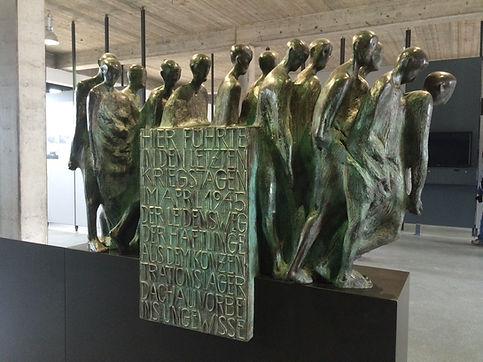

Inside Operation Vigil
A Personal Journey Through History
Operation Vigil is an optional reflective layer woven through Rise of the Nazi Police System. On the first evening in Munich, participants who choose to engage receive a sealed dossier containing a historically grounded identity—someone whose life intersected with the rise, enforcement, or resistance to authoritarian rule.
Throughout the seminar, brief “Vigil Prompts” are delivered at key turning points—after Dachau, at the Rally Grounds, inside Courtroom 600, at the Heydrich memorial, or following our visit to Lidice. These prompts are not theatrical reenactments. They are structured moments of moral inquiry.
You may keep your role private. You may share it. You may journal quietly.
Operation Vigil asks not: What happened?
But rather: Where might I have stood?
On our final evening in Prague, participants are invited—never required—to reflect on how their “vigil” evolved as the seminar moved from consolidation of power, to spectacle, to justice, to resistance, and finally to regime transition.
Operation Vigil is not about role-play. It is about moral proximity.
How the Operation Works
-
On Day 1, participants receive a sealed dossier with their role: a historically grounded identity who lived during the rise of the Nazi police state.
-
During the seminar, you’ll receive a series of brief “Vigil Prompts” at key moments—usually delivered over dinner, during group reflection, or with your morning briefing.
-
You are welcome to keep your role private or discuss it with others as the trip unfolds.
-
On our final evening together, participants will have the opportunity, but never the obligation, to share reflections from their “vigil” with the group.
Why it matters:
Operation Vigil is about seeing yourself in the moral landscape of history and asking what it means to be a witness, a bystander, a resistor, or a participant.
A Sample Vigil:
🕯️ Day 2: Dachau
Your Identity: Paula Schneider, 28, Nurse, Catholic Charities Volunteer, Munich
Date: May 1936
Vigil Prompt:
You were among the few volunteers allowed to deliver care packages—food, letters, sometimes medicine—to Catholic prisoners at Dachau. A young man you’ve been visiting each week has stopped appearing on your roster. You ask about him at the gate and are told: “Transferred.” The guard shrugs, then adds under his breath, “You’re better off not knowing.” You’ve heard rumors about “medical experiments” from another nurse, but saying so out loud would be reckless. That night at mass, you overhear an older woman whisper, “If they could do it to him, they could do it to my Franz.”
What do you believe happened to him? Do you ask questions? Do you speak up? Do you continue volunteering—or quietly stop going? What does “caring for the vulnerable” look like in a place where you might become one of them?
As the operation unfolds, you’ll discover that vigilance is not just about watching others—it’s about confronting your own instincts, choices, and allegiances. Operation Vigil challenges you to question what’s right when the rules shift. It challenges you to remember that history is written through the actions of individuals who made their choices. Where will your loyalties lie when the shadows close in?
